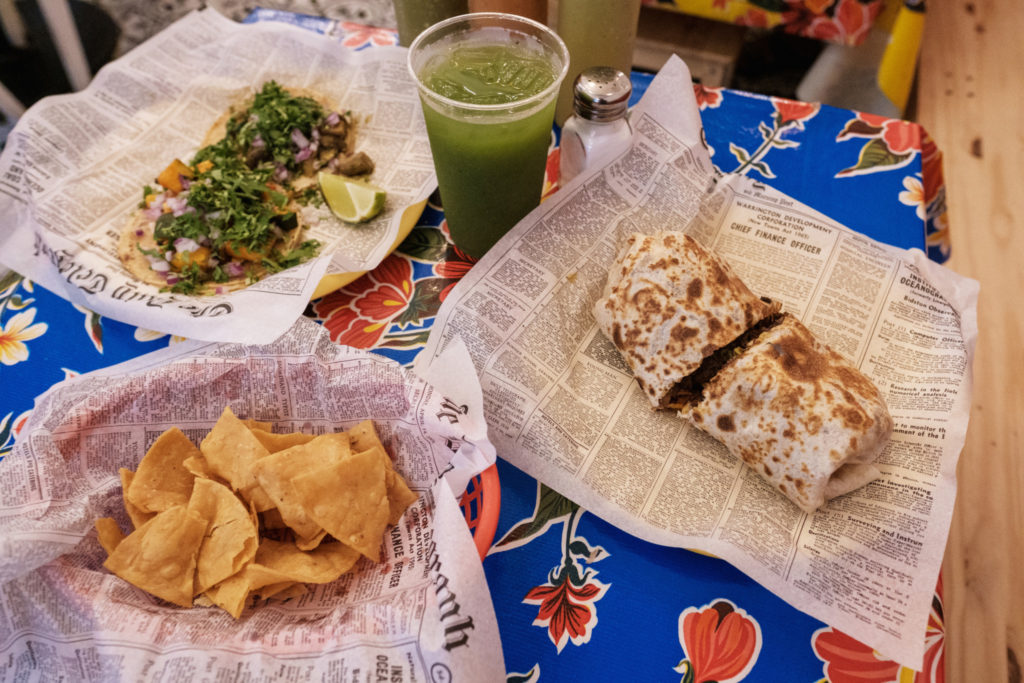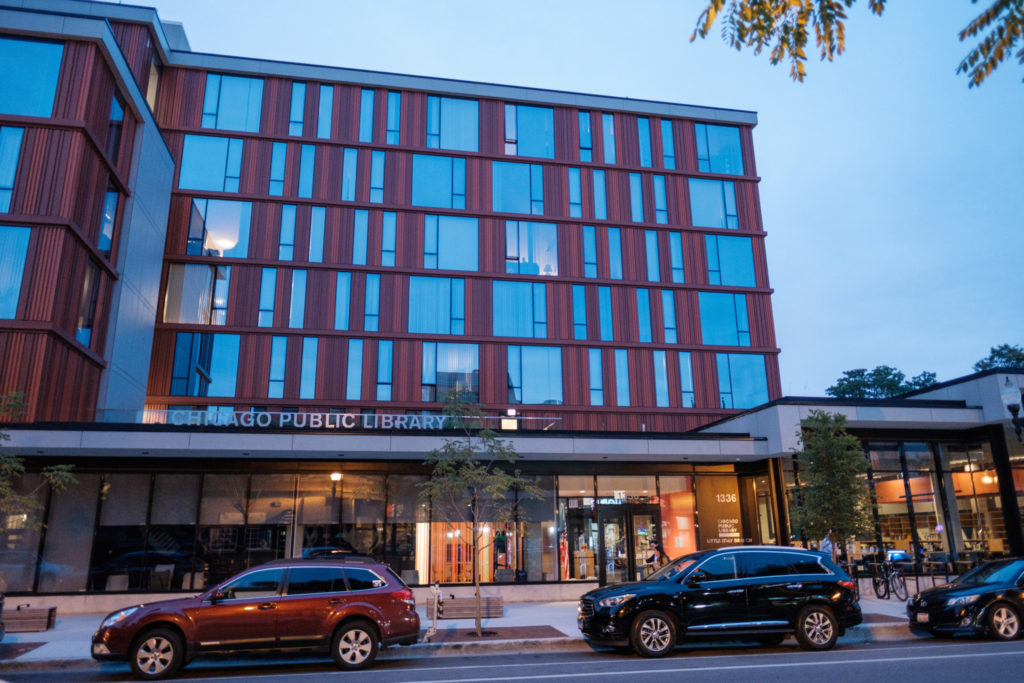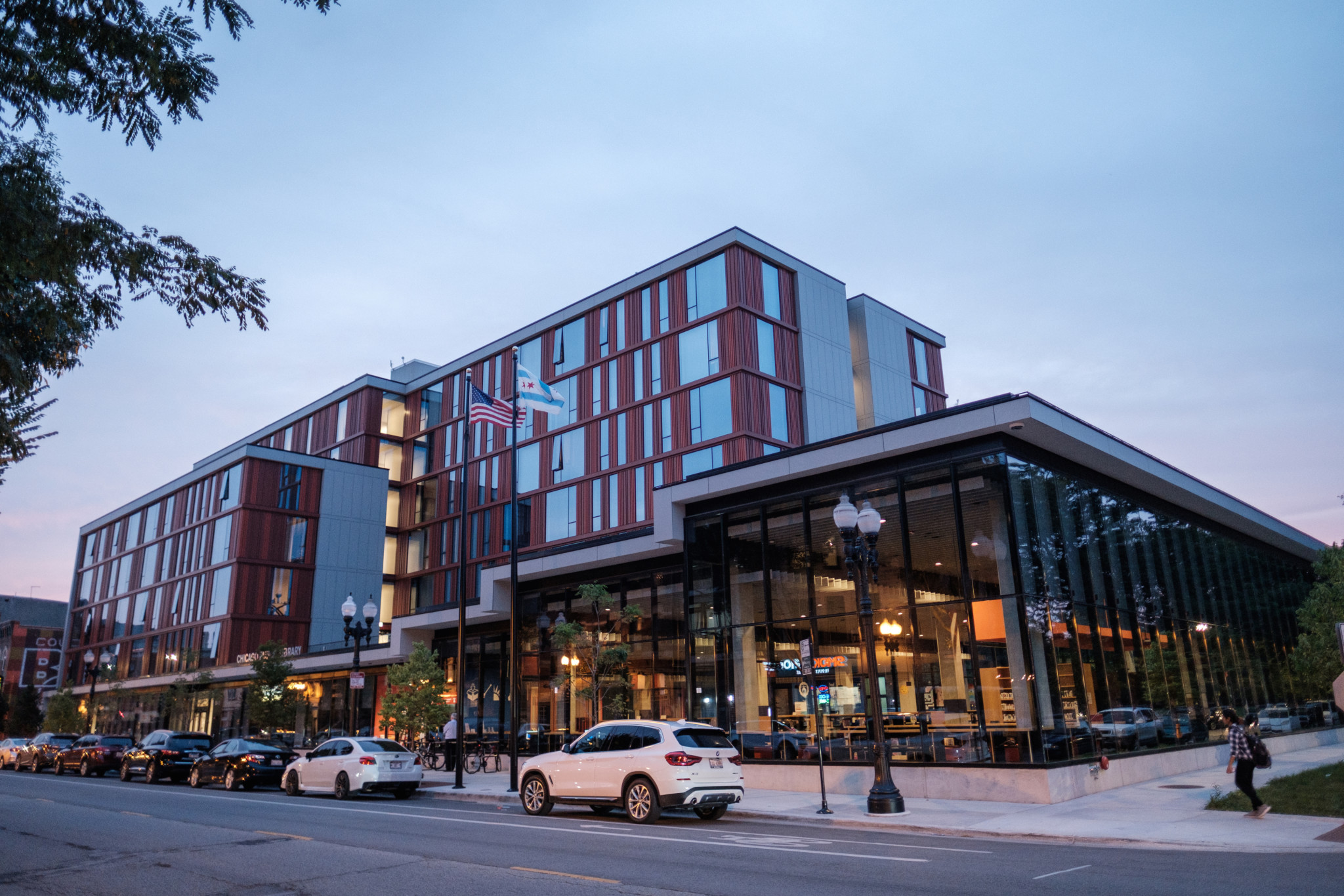- Best Food-Truck-Turned-Brick-And-Mortar: Jarabe
- Best Free Writing Spot: Little Italy (Roosevelt) Branch
- Best Board Game & Dessert Café: Relo’s
- Best Break from Brutalist Architecture: UIC College of Pharmacy
- Best All-You-Can-Eat Thali: Siri Indian
The history of Little Italy/Tri-Taylor is full of children. Here, Jane Addams established her renowned settlement house, Hull-House, which served immigrant children from 1889 to the 1960s. Thousands of kids grew up here in public housing complexes like Roosevelt Square, ABLA/Brooks Homes, Loomis Courts, and Barbara Jean Wright Courts. And at the Maxwell Street Market, kids of vendors would even play their own roles like police lookout for informal vendors.
Little Italy/Tri-Taylor raised me too. My preschool memories of UIC Children’s Center are all out on the playground. (Teacher Kim is still there and just sent her kids to college). My first awkward dance with a classmate at a bat mitzvah was in the back room of Pompei restaurant. And in high school I spent countless hours outside the Taylor Street Starbucks, wondering who in the world Joe DiMaggio was—and why, if he never lived here, did he get his own plaza in Chicago?
I wish I could ask all the kids and former kids living here how they define Little Italy/Tri-Taylor, because its boundaries and definition are somewhat nebulous. In this issue we roughly delineate “Little Italy/Tri-Taylor” as 15th Street to the south, Harrison Street to the north, Union Avenue to the east, and Western Avenue to the west. However, as we explore in this section, names matter, and this name is wholly inadequate to describe the area in which UIC now forms the beating heart (or the virus—depends on your perspective). Subsets of this area include Illinois Medical District, Taylor Street, and University Village.
Children continue to occupy various spaces in the Little Italy/Tri-Taylor area. Children still live at the remaining public housing sites here. One space that implores a transformation is the Cook County’s Juvenile Temporary Detention Center on Roosevelt and Ogden, where children are caged (does jailing a twelve-year-old heal anybody?). And every fall, a new batch of kids arrive here ready to grow up: UIC college freshmen. As Little Italy/Tri-Taylor inevitably changes, there will always be one litmus test I use to judge the condition of the neighborhood: how are the kids?
Erica Knox is a graduate of UIC Children’s Center and Whitney M. Young Magnet High School, both of which are in close proximity to Little Italy/Tri-Taylor. Their mom has worked at the corner of Roosevelt & Ashland Erica’s entire life.
Best Food-Truck-Turned-Brick-And-Mortar
Jarabe

Jarabe (aptly, “cure-all syrup” in Spanish) is hard to miss on the less populated west-of-Damen portion of Taylor Street. The storefront beckons with a bright red insignia, reminiscent of the La Adelita logo of its food truck days. Brothers Teddy and Alexis Vejar own and operate this no-frills Mexican street food joint.
For me, La Adelita was the original Hyde Park food truck. Every Friday during the summer of 2013, I would scan the food trucks gathering outside the hospital for the La Adelita red: a color that still evokes the visceral experience of a chicken tinga torta, my weekly treat-to-self. Teddy, who often worked the truck, would sometimes further sweeten my day with a complimentary agua de jamaica. I was elated to learn that La Adelita’s closing was actually to allow for its growth into Jarabe, a brick-and-mortar space. And to my shock, when I visited Jarabe for the first time in 2016, Teddy remembered me from my time as a La Adelita regular. I like to think that I had followed Jarabe to its new home.
Jarabe has expanded its vegetarian options since La Adelita, which parallels my own trajectory. The Mojo Mushrooms burrito bowl—which I drown in a green salsa that I wish I could start an IV of—is especially satisfying. Perhaps most importantly, I finally know where to send my Texan transplant friends, who love to bemoan the purported elusiveness of Tex-Mex cuisine in Chicago. Jarabe keeps an eye out for them with its twelve options–deep breakfast array, including the Tex-Mex favorite (or so I’ve heard) “migas” taco.
Apparently, La Adelita is forever—you can still book the truck for parties. (Stephanie Bi)
Jarabe Mexican Street Food, 2255 W. Taylor St. Monday–Friday, 9am–9pm; Saturday, 9am–5pm. (312) 725-0507. jarabechicago.com
Best Free Writing Spot
Little Italy (Roosevelt) Branch

Finding a good place to write is harder than finding a library on the South Side that’s open on Sundays. (There is one—it’s in Washington Heights.) As I worked on my thesis this past winter, I needed a place that was free or low-cost, had good lighting, and had low ambient noise. Chicago Public Library’s Little Italy Branch had all three. Located on the former ABLA public housing site, the Little Italy Branch opened earlier this year in a brand-new building. Upon completion, the building will pair the library with seventy-three residential apartments, thirty-seven of which will be managed by the Chicago Housing Authority. The library-public housing project has been touted by the City as being part of the “renaissance of Taylor Street.”
The original library that served the Little Italy neighborhood was located on Roosevelt, and appropriately named the “Roosevelt Branch.” Despite moving to Taylor Street in 1998, however, the library retained its name until reopening at its new location this year. The Little Italy Chicago Neighborhood Association, which formed in opposition to the library-CHA project, lost its fight against the library’s location, architecture, and housing component—but successfully pressured the city to change the library name from Roosevelt to Little Italy. Residents from University Village, ABLA/Brooks Homes, Roosevelt Square, Loomis Courts, and Barbara Jean Wright Courts fought the name change because they see it as exclusionary toward the broader neighborhood. As one commenter on their online petition put it: “I’m not understanding why the name had to be changed, when there was a problem with the name we had. It gave the community a sense of belonging, now it feels like we’re being pushed out.”
Based on 2017 census data, there are only thirty-eight Italian immigrants in all of the Lower West Side, but previous generations are memorialized in places like the National Italian American Sports Hall of Fame. CHA residents are still here, but their numbers have shrunk dramatically since the Plan for Transformation razed local public housing.
I agonized over the thousands of words I wrote for my thesis inside the Little Italy (Roosevelt) CPL Branch. Hopefully, future namings across Little Italy/Tri-Taylor will better remember everyone who has shaped the neighborhood. (Erica Knox)
Little Italy Branch, Chicago Public Library, 1336 W. Taylor St. Monday and Wednesday, noon–8pm; Tuesday and Thursday, 10am–6pm; Friday and Saturday, 9am–5pm. (312) 746-5656. chipublib.org
Best Board Game & Dessert Cafe
Relo’s
Relo’s, which takes its name from a portmanteau of co-owners Regen and Lou’s names, has a lot to offer. After walking past the free parking and outdoor patio, patrons are greeted with a beautiful space composed of brick walls, wood features, and Tiffany Blue accents. There’s plenty of seating space at various booths—and close to three hundred games in the back of the cafe.
Relo’s accomplishes more than just providing great games and tasty treats: it fills a lacuna in the South Side’s leisure spaces. “We’re really trying to make Relo’s a space where people can feel comfortable doing what they like and enjoying the company of friends and family,” said Lou.
“While we allow BYOB, we also pride ourselves in being an alternative to the many local bars in our neighborhood. Regen and I sometimes like that quiet hangout spot, and we’re not really drinkers, we just want a space that’s comfortable where we can catch up and hang out, and that’s what we created Relo’s to be.” And at only five dollars a person for unlimited games, Relo’s isn’t just a fun option for groups, but an incredibly affordable game space on the South Side.
What’s perhaps most exciting about Relo’s is its success in building strong relationships with other local businesses in the greater Chicagoland area after only four months in business. Among the many guests excitedly playing games like Splendor or Ticket to Ride, you’ll see just as many sipping Intelligentsia coffee and eating towering desserts using freshly made waffles and local ice cream.
“Don, who’s our coffee trainer, invited us to [Intelligentsia] multiple times to train us on how to create the perfect latte, and even came to our cafe multiple times to help set us up and teach us how to use all the new equipment,” Lou said of Relo’s relationship with Intelligentsia. “We’re very happy with the relationship we have with them, and we look forward to continue working with them closely.”
Relo’s also uses Mt. Prospect’s Capannari Ice Cream as a core ingredient in their mouthwatering desserts. “Meg and Jim [of Cappanari] really care about our business and our success. And Meg, as another woman in business, has become an inspiration to me. They’ve made personal deliveries to us when we were in a bind,” said Lou. “These guys have dozens of accounts, there’s really no need for them to deliver two tubs of ice cream for us. But they did it because they really care about our business.” While Relo’s is (quite literally) a new kid on the block, they’re certainly not shying away from being an active part of the Chicago community.
When asked if there’s anything else they’d like the community to know about Relo’s, Lou and Regen had only words of appreciation. “Without you guys, we wouldn’t be able to do what we love and keep this dream alive. Many of you have helped us promote our cafe by telling friends and sharing your enthusiasm for the cafe. We’re so grateful for the support and love we’ve received—it’s honestly such a special environment that we’ve created. I don’t know of many other establishments that have this kind of supportive following, and we’re thankful for each and every one of you.” (Alejandro Ruizesparza)
Relo’s Board Game & Dessert Cafe, 1321 W. Taylor St. Monday–Thursday, 2pm–midnight; Friday & Saturday, 11am–1am; Sunday 11am–11pm. (312) 819-7356. reloscafe.com
Best Break from Brutalist Architecture
UIC College of Pharmacy
Walking around campus at the University of Illinois at Chicago (UIC), the architecture is hard to miss. “Brutalism” describes a school of architecture popular in the 1950s through the 1970s that relies heavily on concrete, block shapes, and repetition. Critics argue that brutalism—which is often used for public buildings, like state universities—gives buildings the appearance of a bunker.
When Walter Netsch designed UIC’s campus in the mid-1960s, his brutalist style laid the groundwork for UIC’s future aesthetic. Sometimes, though, you need a break from all the fortresses. Tucked away in the medical district, the College of Pharmacy building is large and rectangular, but noticeably less confrontational than most UIC buildings. Admirers are met by a thematic mortar and pestle statue outside the front door, the base of which also serves as an excellent sitting area in warmer months. Benches across the street in front of the Clinical Sciences North building serve as a great place to soak up the pleasantly underwhelming architecture of the College of Pharmacy.
Brutalism still shapes design decisions at UIC today. Two of the three finalists for UIC’s new Center for the Arts remain in the brutalist tradition, while one significantly departs from it. UIC’s commitment to staying on brand is admirable, but perhaps a new building is an opportunity to diversify its architecture. (Erica Knox)
UIC College of Pharmacy, 833 S. Wood St. Admire it from the outside 24/7.
Best All-You-Can-Eat Thali
Siri Indian
On a grey Sunday, I open the door to Siri, an Indian restaurant in Little Italy, and find a person waiting at an open table gesturing for me to sit. The water carafe is full, and so are a dozen chafers and trays lined up at the far end of the room with bountiful piles of stews, starches, and curries. When I arrive, several tables are open—but not fifteen minutes pass before all are snatched up and a line for the buffet materializes. I grab what looks like a twenty-inch plate and start to devise a plan, because the dish size and heaping portions suggest that this meal requires endurance.
If you are a vegetarian, you’ll be gladdened by the selection of options, from veggie biryani to methi paneer. In fact, you’ll flutter your eyes to find nine out of thirteen trays at the buffet station are there for you and your vegetarian diet. At the last station, you will find two silver canisters. One is stockpiled with naan, and the other is a dessert—but one you’ll want to circle back to, so as not to spoil lunch.
Remember the large plate I picked up? Siri serves traditional Indian food from the north and south of India on a large platter, or thali, sized to fit containers of sauce, stews, and curry that circle around a center of rice. Traditionally—and for those in the know—the thali is stocked with up to six flavors in small bowls, or katori. Looking back, I’m relieved not an eyebrow was raised at the heaps of food cross-contaminated on my own plate.
Somehow I’m able to fit mah chholey, biryani rice, coconut kesari, a bowl of rasam stew, sambar stew, and punugulu on my plate, and still find room for dessert—which today is a mango kulfi. The rasam stew is cumin galore: the seeds swirl in broth like maritime traffic, sharing the open tomato waters with whole garlic cloves, coriander seeds, and a bouquet of spices. The punugulu, a common street food in India, can hold its own—the tastes of coriander and cumin catch up fast once you pass the oily but firm dough crust.
Someone recommends I dunk the punugulu in the sambar stew. I discover that the dough and stew fit together like a key in a lock. Back at the silver canister, I prepare for dessert: mango kulfi, an Indian ice cream loaded with cardamom, milk, sugar, and, of course, silky mango. An ice cream scooper points toward the canister handle, inviting you to decide how much to take on—and even if you’re unsure how much room is left, once you sample the kulfi, you’ll find space mysteriously opens up.
In Indian cuisine, a buffet is not a strategy for accommodating people with a range of dietary needs and appetites, but part of a Sikh tradition known as langar—which more or less means a community meal, commonly served buffet-style in temple. When I dine at Siri, it is close to 1pm on a Sunday, the middle of lunch rush, and the intention Siri’s owners have for the space is palpable. You won’t be eating alone: even if you dine solo, you will be in the company of a family-run restaurant where guests are provided sustenance and are cared for as a community. And you’ll be hooked. (Leo Williams)
Siri Indian Restaurant, 1520 W. Taylor St. Monday–Thursday, 11:30am–2:30pm and 5:30pm–10pm; Friday, 11:30am–10pm; Saturday–Sunday, 7am–10am and 11:30am–10pm. (312) 766-7474. sirichicago.com

